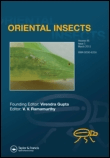
ORIENTAL INSECTS
Scope & Guideline
Advancing Knowledge in Oriental Insect Science
Introduction
Aims and Scopes
- Taxonomy and Systematics:
The journal frequently publishes articles that describe new species and genera, as well as taxonomic revisions of existing groups, highlighting its core focus on the classification and systematics of insects. - Ecology and Biodiversity Studies:
Research on insect ecology, including species composition, distribution patterns, and community dynamics, is prominent, reflecting a commitment to understanding biodiversity and ecological interactions. - Pest Management and Agricultural Entomology:
Many studies address insect pests affecting agriculture, including identification, management strategies, and ecological impacts, which is crucial for sustainable agricultural practices. - Molecular and Phylogenetic Studies:
The journal includes molecular analyses and phylogenetic studies that contribute to the understanding of evolutionary relationships among insect taxa, utilizing DNA barcoding and genomic studies. - Regional Focus:
The emphasis on insects from the Oriental region, including Southeast Asia, South Asia, and parts of the Middle East, distinguishes the journal as a key resource for regional entomological research.
Trending and Emerging
- Invasive Species Research:
There is a noticeable increase in studies addressing invasive insect species, their ecological impacts, and management strategies, highlighting the growing concern over biodiversity loss and ecosystem health. - Molecular Taxonomy and Phylogenetics:
The use of molecular techniques for species identification and phylogenetic analysis is on the rise, indicating a trend toward more precise and scientifically rigorous methods in taxonomy. - Integrated Pest Management (IPM) Strategies:
Research articles focusing on integrated pest management approaches are trending, showcasing a shift towards sustainable practices that consider ecological and economic factors in pest control. - Ecological Interactions and Community Dynamics:
There is an increasing focus on the interactions between insect species and their environment, including studies on pollinators, symbiotic relationships, and community structure. - Technological Innovations in Entomology:
Emerging methodologies, such as the application of machine learning for pest detection and analysis, are becoming more prominent, reflecting the intersection of technology and entomological research.
Declining or Waning
- General Insect Behavior Studies:
Articles focusing on broad behavioral studies of insects have become less common, possibly due to a shift towards more specific ecological or pest-related research. - Conventional Laboratory Studies:
Research that relies solely on traditional laboratory experiments without field validation appears to be declining, as the journal increasingly values integrative approaches that combine field and lab work. - Insect Physiology:
Research centered on insect physiology has seen a reduction in frequency, reflecting a potential waning interest compared to ecological and taxonomic studies.
Similar Journals

Insect Conservation and Diversity
Connecting Researchers for a Diverse EcosystemInsect Conservation and Diversity is an esteemed academic journal dedicated to the field of insect science, published by WILEY in the United Kingdom. With its ISSN 1752-458X and E-ISSN 1752-4598, this journal serves as a vital resource for researchers and professionals striving to advance knowledge in biodiversity and conservation. The journal holds an impressive Q1 ranking in both Ecology, Evolution, Behavior and Systematics and Insect Science as of 2023, which reflects its rigorous peer-review process and significant contributions to the field. Recognized for its high-quality publications, Insect Conservation and Diversity ranks 9th out of 181 in insect science and 72nd out of 721 in ecology within Scopus, placing it in the top tiers of academic journals. Researchers are encouraged to submit their work from 2009 to 2024, enhancing our understanding of insect biodiversity and conservation strategies. Aimed at fostering advancements in knowledge and collaborative efforts, this journal is essential for all those committed to the study and preservation of insect diversity.
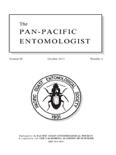
PAN-PACIFIC ENTOMOLOGIST
Bridging Knowledge Gaps in Insect SciencePAN-PACIFIC ENTOMOLOGIST, published by the PACIFIC COAST ENTOMOLOGICAL SOCIETY, serves as a pivotal platform for disseminating research in the field of entomology, encompassing a variety of topics related to insects and their interactions within ecosystems. Operating under the ISSN 0031-0603 and E-ISSN 2162-0237, this esteemed journal has been committed to advancing our understanding of insect science since its initial publication in 1993, with coverage extending to 2024. Notably categorized in the Q4 quartile of the insect science category and ranked in the 5th percentile of Scopus, PAN-PACIFIC ENTOMOLOGIST offers a unique opportunity for scholars, professionals, and students to engage with cutting-edge research and contribute to the scientific dialogue within this specialized field. While currently not open access, the journal is dedicated to the dissemination of empirical studies, reviews, and short communications that elucidate the crucial roles insects play in agriculture, ecology, and public health. Situated in the heart of San Francisco, California, this journal not only enriches the academic community but also promotes a deeper appreciation for the diverse and often under-appreciated world of entomology.

CANADIAN ENTOMOLOGIST
Exploring the Intricacies of Insect LifeCanadian Entomologist, published by Cambridge University Press, is a prominent journal dedicated to the field of entomology, covering key areas such as insect science, ecology, and evolutionary biology. With its origins dating back to 1868, this esteemed journal has continuously contributed to the understanding of insect behavior, systematics, and physiology, engaging researchers and professionals alike. Although currently not an Open Access journal, it offers valuable insights through its rigorously peer-reviewed articles, reflecting its commitment to scientific excellence. The journal has garnered a respectable Q3 ranking in various categories, including Ecology, Evolution, Behavior, and Systematics, making it a critical resource for scholars and students who seek to explore the complex interactions within insect populations and their environments. Researchers can trust Canadian Entomologist to provide relevant and impactful research that shapes contemporary understanding in the realm of entomological studies, fostering the growth of this vital scientific discipline.

Journal of Insect Biodiversity
Connecting Researchers to the World of InsectsJournal of Insect Biodiversity, published by MAGNOLIA PRESS in New Zealand, offers a vital platform for researchers and professionals interested in the intricate world of insect science. Established in 2019, this journal covers a wide array of topics within its field, focusing on the ecological, evolutionary, and behavioral aspects of insects, while also engaging with paleontological perspectives. With an impressive Q2 and Q3 categorization in multiple ecological disciplines and a growing influence in the Scopus rankings, it serves as an essential resource for scholars aiming to deepen their understanding of insect diversity and its implications for ecosystems. The journal is committed to open access, promoting the dissemination of knowledge without barriers. Researchers, students, and professionals alike will benefit from the timely contributions this journal offers as it continues to reflect the dynamic and evolving nature of insect research up to the year 2024.

INSECT SYSTEMATICS & EVOLUTION
Unraveling the Mysteries of Insect EvolutionINSECT SYSTEMATICS & EVOLUTION is a prestigious journal published by BRILL, which has been a vital source of scholarly information since its inception. Specializing in the fields of ecology, evolution, behavior, and systematics within the realm of insect science, this journal garners significant attention with its 2023 ranking in the second quartile across multiple categories, highlighting its relevance and impact in the field. With a focus on advancing knowledge through innovative research and reviews, it serves as an essential platform for researchers, professionals, and students alike, promoting an understanding of insect biodiversity and systematics. The journal’s accessibility options, including its Open Access policy, combined with a broad international scope, ensure that critical findings reach a diverse audience, fostering collaboration and discourse within the scientific community. Situated in the Netherlands, INSECT SYSTEMATICS & EVOLUTION maintains its commitment to excellence and strives to contribute actively to the ongoing dialogue in insect science, making it a must-read for anyone interested in the intricate world of insects.
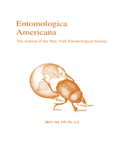
Entomologica Americana
Bridging Science and Conservation in EntomologyEntomologica Americana is a pivotal journal in the field of Insect Science, published by the esteemed New York Entomological Society Inc. With its ISSN (1947-5136) and E-ISSN (1947-5144), this journal serves as a critical resource for researchers, professionals, and students dedicated to the study of entomology. Although it is categorized in the Q4 quartile for Insect Science as per the 2023 Scopus Rankings, where it ranks 179 out of 181, it continues to provide valuable insights into various aspects of insect biology, ecology, and conservation. The journal has been actively publishing since its convergence years from 2009 to 2017, and in selected years thereafter, including 2019, 2021, and 2023. Located at the iconic American Museum of Natural History in New York City, Entomologica Americana is a testament to the ongoing exploration and understanding of the insect world that underpins biodiversity and ecosystem health. Although it does not operate under an Open Access model, it offers a vital platform for scholarly communication and the dissemination of research findings, making it indispensable for anyone involved in or entering the fascinating field of entomology.
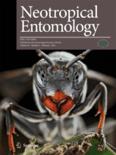
NEOTROPICAL ENTOMOLOGY
Illuminating the World of Insects in the NeotropicsNEOTROPICAL ENTOMOLOGY, published by the Entomological Society of Brazil, is a leading journal in the field of Insect Science, recognized for its significant contributions to the understanding of entomological research within the Neotropical region. With an impact factor placing it in the Q2 category and ranked #52 out of 181 in the Scopus rankings for Agricultural and Biological Sciences, this journal provides a vital platform for both seasoned researchers and emerging scholars to publish their innovative findings. Covering a broad scope of topics related to entomology, NEOTROPICAL ENTOMOLOGY aims to highlight the unique biodiversity and ecological significance of insects, fostering further appreciation and study within this crucial area of life sciences. The journal is available in both print (ISSN: 1519-566X) and online (E-ISSN: 1678-8052), ensuring accessibility to a wide audience and enhancing the dissemination of knowledge. As it converges towards its 2024 volume, the journal remains committed to advancing the scientific understanding of insect life in the tropics, making it an essential resource for researchers, professionals, and students alike.
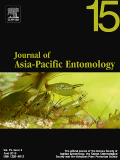
JOURNAL OF ASIA-PACIFIC ENTOMOLOGY
Navigating the Diverse Landscape of Insect ScienceJOURNAL OF ASIA-PACIFIC ENTOMOLOGY, published by the Korean Society of Applied Entomology, is a distinguished platform that fosters the advancement of knowledge in the field of entomology, specifically tailored to the Asia-Pacific region. Since its inception in 1998, this journal has been instrumental in providing critical insights into the diverse aspects of insect science, reflecting its commitment to supporting both research and application in a variety of contexts, including agriculture and environmental sustainability. The journal is categorized in the Q3 quartile for Insect Science according to the 2023 rankings, and it holds a respectable Scopus rank of #62 out of 181 in its niche, situating it within the top 66th percentile of its field. With a focus on peer-reviewed research that emphasizes innovation and practical applications, the journal serves as an essential resource for researchers, professionals, and students seeking to deepen their understanding of entomological studies and their implications across ecological and agricultural landscapes.
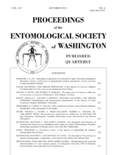
PROCEEDINGS OF THE ENTOMOLOGICAL SOCIETY OF WASHINGTON
Advancing the Frontiers of Insect ScienceProceedings of the Entomological Society of Washington is a distinguished journal dedicated to the field of entomology, published by the Entomological Society of Washington. With a rich history dating back to 1981 and a commitment to fostering scientific discourse, this journal serves as a vital platform for researchers and professionals specializing in insect science and ecology. It holds a respectable<> impact factor and is categorized in the Q3 quartile in both Ecology, Evolution, Behavior and Systematics and Insect Science, indicating its relevance within the scientific community. Although it does not offer open access, it provides a curated selection of high-quality research articles that significantly contribute to the understanding of insect biology, behavior, and taxonomy. The journal aims to bridge gaps in current research and inspire innovations in entomological studies, making it an essential resource for students, researchers, and practitioners in the field.

FRAGMENTA ENTOMOLOGICA
Bridging theory and practice in insect research.FRAGMENTA ENTOMOLOGICA is a prominent peer-reviewed academic journal published by UNIV DEGLI STUDI DI ROMA LA SAPIENZA, focusing on various dimensions of entomology and insect science. With an ISSN of 0429-288X and an E-ISSN of 2284-4880, this journal has embraced an Open Access model since 2006, ensuring that valuable research is widely accessible to the global scientific community. Based in Italy, at the DIPARTIMENTO DI BIOLOGIA ANIMALE E DELL'UOMO in Rome, FRAGMENTA ENTOMOLOGICA is recognized for its commitment to high-quality research, ranking in the Q3 category across multiple categories, including Ecology and Insect Science, in 2023. Its Scopus rankings further underscore its relevance, showcasing its role in advancing knowledge in the fields of Ecology, Evolution, and Insect Behavior. This journal serves as an essential resource for researchers, professionals, and students interested in the intricate world of insects and their ecological roles, fostering academic discourse that bridges theoretical and practical entomological studies.